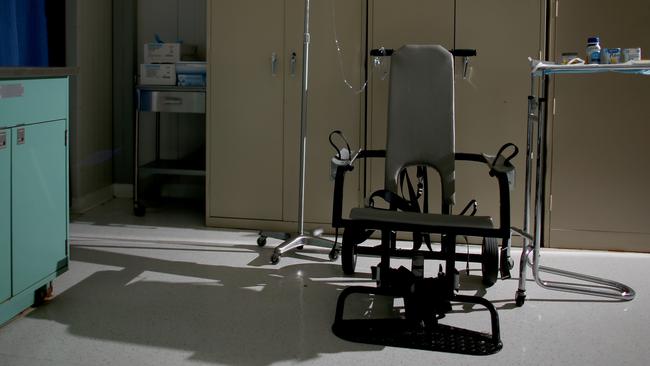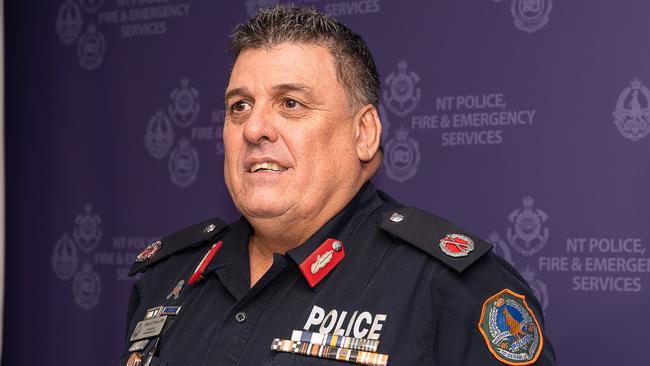NT Police Association fight to use spit hoods and restraint chairs on children
The police union has come out swinging to defend officers’ ability to use ‘archaic’ and ‘unjustifiable’ spit hoods and restraint chairs on Territory kids.

News
Don't miss out on the headlines from News. Followed categories will be added to My News.
Calls to ban the use of ‘torture devices’ on children in Territory cop shops have been opposed by the police union.
The Office of the Children’s Commissioner released a position paper on Tuesday calling for a legislated prohibition on the use of spit hoods and restraint chairs on children.
Police and Territory Families Minister Kate Worden said the current procedural police bans on spit hood use would continue, but would not comment on legislative protections.
“The Northern Territory government has banned spit hoods in our youth detention centres and banned the use of spit hoods on young people in police watch houses,” she said.
“We’ve already got that in place and that won’t be changing.”
Ms Worden made no comment on the continued use of restraint chairs on children.
Despite both restraints being described by the United Nations as ‘torture devices’, the Northern Territory Police Association has opposed calls for a legislated ban.
President Nathan Finn said he recognised it was a “contentious issue”, but said the safety of police should come before children under arrest.
“It’s simple: if offenders don’t want a spit guard applied, don’t spit at or towards our officers, or bite,” Mr Finn said.
“There should be more protections for our members, not less.”
“The NTPA maintains the position that these protective options should be available to police for both youth and adult offenders.
“A procedural ban on the use of spit guards on youth offenders is sufficient.”
Mr Finn also backed the continued use of restraint chairs on children, saying it was used when a person was violent or self-harming.
“The alternative is ground stabilisation, or restraint to a bed as used in medical facilities – which means a greater risk of asphyxiation – or the removal of items that could be used to self-harm such as clothing, and the offender being placed in a padded cell,” he said.
This is despite the OCC finding restraint chairs were not used on children in New South Wales, Victoria, Tasmania, where police were instead trained to identify mental illness, de-escalate, use crisis intervention techniques, physically distance and regularly monitor those at risk of self-harm.
On Tuesday, following the report’s release, Assistant Police Commissioner Bruce Porter confirmed police were still using restraint chairs.

He would not comment on police’s position on any bans on the restraint device, or legislation formally barring the use of spit hoods on children.
“That is a matter for government to decide where we will go with legislation in relation to that,” Mr Porter said.
Since October a procedural ban on the use of spit hoods on children has been in place, with police instead using personal protective equipment like full face shields.
However the police union has claimed the equipment was “impractical at best” and could impair police situational awareness and ability to use force.
Mr Finn claimed the restraints protected against diseases, despite the OCC position paper finding “the overwhelming medical evidence shows that spit hoods were not effective at preventing communicable disease transmission”.
The Australian Federal Police — who ended its use of spit hoods in April — found “the risk of using spit hoods outweighed the benefits of their use, given they are ineffective in protecting against transmissible diseases”.
Mr Finn said spit hoods usage was “rare” and “only considered when all other options have been exhausted when dealing with offenders who spit, or attempt to spit, or exhibit aggressive behaviour”.
However in the latest Ombudsman’s annual report Peter Shoyer said an upcoming investigation into spit hoods and restraint chairs would likely highlight issues in youth policing.
Mr Shoyer said after reviewing footage he noticed during interactions between children and police, officers often had an “an emphasis on gaining immediate control of the situation, at the expense of communication”.
“There continue to be some cases in which we identify situations where further attempts at genuine conversation and clearer communication with youths may have avoided escalation of situations that ultimately resulted in use of force,” he said.
Attorney-General Chansey Paech has been contacted for comment.
But in April spit hood bans were discussed as the nation’s top legal representatives met in Darwin for the Standing Council of Attorneys-General meeting.
The Attorneys-General agreed to work together to “consider the feasibility of nationally co-ordinated actions — including legislative prohibition — to prohibit the use of spit hoods”.
South Australia has legislated a ban on all police use of spit hoods, while Queensland police instituted a procedural ban on its use on kids and adults in September 2022.
Originally published as NT Police Association fight to use spit hoods and restraint chairs on children



